https://sputniknews.in/20230602/opinion-brics-reserve-currency-is-most-promising-alternative-to-us-dollar-2306223.html
OPINION: BRICS Reserve Currency is ‘Most Promising' Alternative to US Dollar
OPINION: BRICS Reserve Currency is ‘Most Promising' Alternative to US Dollar
Sputnik India
The floating of a BRICS common currency would serve as the “most promising possibility” for low and middle-income nations in the Global South to circumvent western sanctions and reduce the hegemony of the US dollar.
2023-06-02T19:05+0530
2023-06-02T19:05+0530
2023-06-02T19:05+0530
sputnik opinion
brics
india
south africa
global south
china
russia
dedollarisation
western sanctions
https://cdn1.img.sputniknews.in/img/07e7/06/01/2289627_0:67:1280:787_1920x0_80_0_0_00dc0d045ffb585b2783bc4983531567.jpg
A BRICS common currency in the near future would serve as the “most promising possibility” for low and middle-income nations in the Global South to circumvent Western sanctions and reduce the hegemony of the US dollar, a South African expert has told Sputnik.Ashraf Patel, a senior research associate at the Pretoria-based Institute for Global Dialogue, which is a member of the South Africa BRICS (SABRICS) Think Tank Network, underlined that BRICS nations have the potential to provide “broad-based economic stability” in the world disrupted by Western sanctions.Listing the benefits of a BRICS currency, the think-tanker said it could help in increasing trade flows at a regional level as well as globally.He noted that the US debt ceiling crisis in the last few weeks shows up the unsustainibility of the American-led financial system. Patel said that the US debt was being “re-exported globally” through trade wars, unilateral sanctions and other coercive economic measures adopted by the rich nations.She said that BRICS is looking to “ensure that we do not become victims to sanctions that have secondary effects on countries that have no involvement in issues that have led to those unilateral sanctions”BRICS’ Strategic Culture More ‘Inclusive’ than West-led SystemPatel said that the “strategic culture” of BRICS was more “inclusive” than the Western system, which has created a “hierarchy of states”.He said that all the BRICS nations were united in their calls for effecting “substantive reforms” in the United Nations (UN) and other multilateral groupings, as well as when it comes to other critical issues such as climate change and fair trade practices through the World Trade Organization (WTO).Patel, however, reckoned that there were a few “differences” in the approach of individual BRICS states on how they should deal with the West and the Global South.For Russia, Patel said that it remained a “key player” globally, especially in terms of energy. He added that Moscow was an influential actor in the Eurasian region and in the eastern hemisphere, with its strategic focus increasingly moving away from Europe in the wake of the special military operation.He said that the foreign policy positions of both South Africa and Brazil (under its current President Luiz Inacio Lula Da Silva) were more pro-Global South and more “non-aligned” than India’s.India’s Role in the WorldPatel said that New Delhi’s position of “strategic autonomy” meant that it has developed close ties with Western-led groupings such as the G7 and remained a member of BRICS at the same time.He noted that New Delhi was also batting for the interests of the Global South, evidenced during its ongoing presidency of the G20.Patel recalled that India and South Africa, another key player in Global South affairs, collaborated in demanding a vaccine Intellectual Property Rights (IPR) waiver from the developed nations during the Covid pandemic.He concluded by saying that New Delhi’s focus was also on reforming the global governance institutions, combatting climate change, and achieving fairness in trade and digital delivery, all of which find a resonance in the Global South.
https://sputniknews.in/20230602/brics-nations-to-instill-new-life-in-unsc-reforms-decry-unilateral-sanctions-2291108.html
https://sputniknews.in/20230602/brics-is-a-symbol-of-change-indias-eam-jaishankar-2292358.html
india
south africa
global south
china
russia
Sputnik India
feedback.hindi@sputniknews.com
+74956456601
MIA „Rossiya Segodnya“
2023
Sputnik India
feedback.hindi@sputniknews.com
+74956456601
MIA „Rossiya Segodnya“
News
en_IN
Sputnik India
feedback.hindi@sputniknews.com
+74956456601
MIA „Rossiya Segodnya“
Sputnik India
feedback.hindi@sputniknews.com
+74956456601
MIA „Rossiya Segodnya“
brics south africa, brics summit south africa, brics currency latest news, trade in indian currency, trade in national currencies, western sanctions
brics south africa, brics summit south africa, brics currency latest news, trade in indian currency, trade in national currencies, western sanctions
OPINION: BRICS Reserve Currency is ‘Most Promising' Alternative to US Dollar
The joint statement by the foreign ministers of Brazil, Russia, India, China and South Africa (BRICS) after their meeting in Cape Town criticizes “unilateral coercive measures” such as sanctions. The BRICS states blamed such measures for triggering “negative effects” on the developing world.
A BRICS common currency in the near future would serve as the “most promising possibility” for low and middle-income nations in the Global South to circumvent Western sanctions and reduce the hegemony of the US dollar, a South African expert has told Sputnik.
Ashraf Patel, a senior research associate at the Pretoria-based Institute for Global Dialogue, which is a member of the South Africa BRICS (SABRICS) Think Tank Network, underlined that BRICS nations have the potential to provide “broad-based economic stability” in the world disrupted by Western sanctions.
“The scope for an alternative currency is more viable in the current world than it has been in the past,” Patel stated.
Listing the benefits of a BRICS currency, the think-tanker said it could help in increasing trade flows at a regional level as well as globally.
“Goods produced in one country can also circumvent trade restrictions between two countries by being exported to, and then re-exported from, a third country,” Patel stated.
He noted that the US debt ceiling crisis in the last few weeks shows up the unsustainibility of the American-led financial system.
Patel said that the US debt was being “re-exported globally” through trade wars, unilateral sanctions and other coercive economic measures adopted by the rich nations.
South African FM Pandor said on Friday that the proposal to float a common BRICS currency was being examined by the Shanghai-based New Development Bank (NDB).
She said that BRICS is looking to “ensure that we do not become victims to sanctions that have secondary effects on countries that have no involvement in issues that have led to those unilateral sanctions”
BRICS’ Strategic Culture More ‘Inclusive’ than West-led System
Patel said that the “strategic culture” of BRICS was more “inclusive” than the Western system, which has created a “hierarchy of states”.
He said that all the BRICS nations were united in their calls for effecting “substantive reforms” in the United Nations (UN) and other multilateral groupings, as well as when it comes to other critical issues such as climate change and fair trade practices through the World Trade Organization (WTO).
Patel, however, reckoned that there were a few “differences” in the approach of individual BRICS states on how they should deal with the West and the Global South.
“China is a clear leader in terms of substantive development and infrastructure finance globally,” he noted.
For Russia, Patel said that it remained a “key player” globally, especially in terms of energy. He added that Moscow was an influential actor in the Eurasian region and in the eastern hemisphere, with its strategic focus increasingly moving away from Europe in the wake of the special military operation.
“India has been taking a more pro-West posture (as compared to other BRICS states), especially with regards to active engagements and agreements with G7 and the Quad,” Patel stated.
He said that the foreign policy positions of both South Africa and Brazil (under its current President Luiz Inacio Lula Da Silva) were more pro-Global South and more “non-aligned” than India’s.
“As BRICS membership expansion grows, it may get more interesting, offering more possibilities,” Patel said. At least 19 countries have expressed an interest in joining the BRICS grouping, a testament to the grouping’s growing global clout.
India’s Role in the World
Patel said that New Delhi’s position of “strategic autonomy” meant that it has developed close ties with Western-led groupings such as the G7 and remained a member of BRICS at the same time.
He noted that New Delhi was also batting for the interests of the Global South, evidenced during its ongoing presidency of the G20.
Patel recalled that India and South Africa, another key player in Global South affairs, collaborated in demanding a vaccine Intellectual Property Rights (IPR) waiver from the developed nations during the Covid pandemic.
“India also has a major pharmaceutical industry and needs markers in the Global South and in Africa,” he said, noting New Delhi’s increasing economic engagements with low and middle-income states.
He concluded by saying that New Delhi’s focus was also on reforming the global governance institutions, combatting climate change, and achieving fairness in trade and digital delivery, all of which find a resonance in the Global South.



